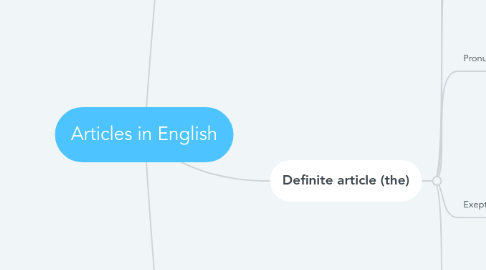
1. Indefinite articles (a / an)
1.1. Use
1.1.1. "a" before all consonants sounds including /j/, /w/ and /h/.
1.1.1.1. Examples:
1.1.1.1.1. a boy a car a university
1.1.2. After already mentioned something or someone for the first time, or it is known by context.
1.1.2.1. Examples:
1.1.2.1.1. On Monday, an unarmed man stole $1,000 from the bank. The thief hasn't been caught yet.
1.1.3. "an" before vowel sounds.
1.1.3.1. Examples:
1.1.3.1.1. an apple an hour
1.2. This is the highest building in New York. You are the tallest person in our class.
1.2.1. Examples:
1.2.1.1. Where is the bathroom? My father enjoyed the book you gave him.
1.3. When to use them
1.3.1. When you mention something or someone for the first time.
1.3.1.1. Examples:
1.3.1.1.1. Would you like a drink? I've finally got a good job
1.3.2. To show that something or someone is one of a group.
1.3.2.1. Examples:
1.3.2.1.1. John is an Englishman. Kate is a Catholic.
1.3.3. When you say what someone's job is.
1.3.3.1. Examples:
1.3.3.1.1. Juan is a teacher. He is an engineer
1.4. When not to use them
1.4.1. With uncountable nouns. Instead we can use some.
1.4.2. With plural nouns
2. Definite article (the)
2.1. When to use
2.1.1. When there is only one of someone or something.
2.1.2. With superlative adjectives.
2.1.2.1. Examples:
2.1.3. With some adjectives to talk about groups of people.
2.1.3.1. Examples: The rich ignore the problems of the poor.
2.2. When not to use
2.2.1. When we speak about people or things in general.
2.2.1.1. Example:
2.2.1.1.1. Elderly require special attention. Babies are born with the ability to learn languages.
2.2.2. With sports, subjects of study and meals.
2.2.2.1. Examples:
2.2.2.1.1. I love playing football Robotics will be one of the most requested degrees in the future What are we having for dinner?
2.2.3. With proper nouns (Names of people, companies, cities, countries, continents, languages, special days, elements).
2.2.3.1. Examples:
2.2.3.1.1. This is my friend Adriana I live in London America is believed to be first discovered by the vikings. Oxygen is vital for the life on earth. Christmast is considered one of the best days of the year.
2.3. Pronunciation
2.3.1. /ðə/ - before all consonant sounds.
2.3.2. /ðiː/ before a vowel sound.
2.4. Exeptions on proper nouns
2.4.1. Countries whose names include words like kingdom, states, rep or have plural nouns as their names.
2.4.1.1. Examples:
2.4.1.1.1. The United Kingdom The United States The Philippines
2.4.2. Geographical features such as mountains ranges, rivers, seas, etc.
2.4.2.1. Examples:
2.4.2.1.1. The Pacific Ocean The Atlantic Ocean The Thames
2.4.3. Newspapers
2.4.3.1. Examples:
2.4.3.1.1. The New York Times The Times
2.4.3.1.2. Well-known buildings or works of art.
2.4.4. Families.
2.4.4.1. Examples:
2.4.4.1.1. The Simpson The Smith
2.5. Mix Categories Sometimes need 'the' and others not
2.5.1. Organisations
2.5.1.1. Examples:
2.5.1.1.1. The Red Cross Green Peace
2.5.2. Universities If the name starts with university 'the' is needed.
2.5.2.1. Examples:
2.5.2.1.1. The University of Edinburgh The University of Sindey Oxford University Harvard
2.5.3. Musical instruments. In British English 'the' is needed, but in American English it is not.
2.5.3.1. Examples:
2.5.3.1.1. BE: I play the guitar AE: I play guitar
2.5.4. Transport. If you use 'by', there is no 'the'. Otherwise 'the' is needed.
2.5.4.1. Examples:
2.5.4.1.1. I'll go by bus. I'm going to take the bus.
2.5.5. Places. Home, work, school, university, bed, church, hospital and jail don't need 'the'. Otherwise 'the' is necessary.
2.5.5.1. Examples:
2.5.5.1.1. I'm going home I'm at university I have an appointment at the dentist
2.5.6. Numbers. Cardinal numbers not need 'the'. Ordinal numbers need 'the'.
2.5.6.1. Examples:
2.5.6.1.1. Room 5 I have 5 books I was the first place He was the twelfth president of this country
